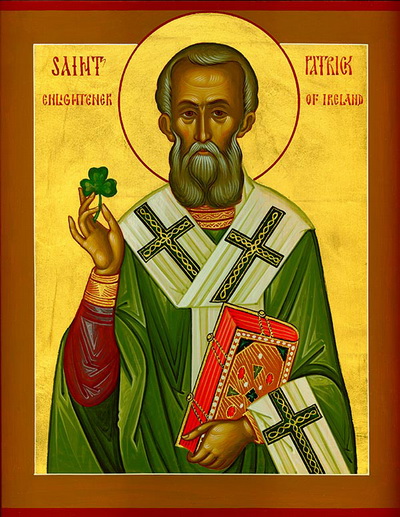
March 17 marks the feast of St Patrick in many places, and for those who say (or want to say) Matins, of the feast, I have posted notes on where to find the various texts required on my Benedictine Matins blog.
For those interested, I have also set up a facebook group where you can discuss posts or ask questions (I envisage the main focus for this being Matins at the moment, but happy to have questions and discussion on broader issues relating to the trad Benedictine Office there as well).
St Patrick
St Patrick lived in the fifth century and is lauded as the apostle to Ireland. Kidnapped by pirates at the age of 16, and forced into slavery as a shepherd, he converted to Christianity and spent long hours in prayer. He eventually managed to escape and make his way home. He had a vision, though,calling him to return:
You can read his own account of his story here, but here are a few key extracts:
My name is Patrick. I am a sinner, a simple country person, and the least of all believers. I am looked down upon by many. My father was Calpornius. He was a deacon; his father was Potitus, a priest, who lived at Bannavem Taburniae. His home was near there, and that is where I was taken prisoner. I was about sixteen at the time. At that time, I did not know the true God. I was taken into captivity in Ireland, along with thousands of others....
After I arrived in Ireland, I tended sheep every day, and I prayed frequently during the day. More and more the love of God increased, and my sense of awe before God... It was there one night in my sleep that I heard a voice saying to me: “You have fasted well. Very soon you will return to your native country.” Again after a short while, I heard a someone saying to me: “Look – your ship is ready.” It was not nearby, but a good two hundred miles away. I had never been to the place, nor did I know anyone there. So I ran away then, and left the man with whom I had been for six years. It was in the strength of God that I went – God who turned the direction of my life to good; I feared nothing while I was on the journey to that ship...
A few years later I was again with my parents in Britain. They welcomed me as a son, and they pleaded with me that, after all the many tribulations I had undergone, I should never leave them again. It was while I was there that I saw, in a vision in the night, a man whose name was Victoricus coming as it were from Ireland with so many letters they could not be counted. He gave me one of these, and I read the beginning of the letter, the voice of the Irish people. While I was reading out the beginning of the letter, I thought I heard at that moment the voice of those who were beside the wood of Voclut, near the western sea. They called out as it were with one voice: “We beg you, holy boy, to come and walk again among us.” This touched my heart deeply, and I could not read any further; I woke up then. Thanks be to God, after many years the Lord granted them what they were calling for.